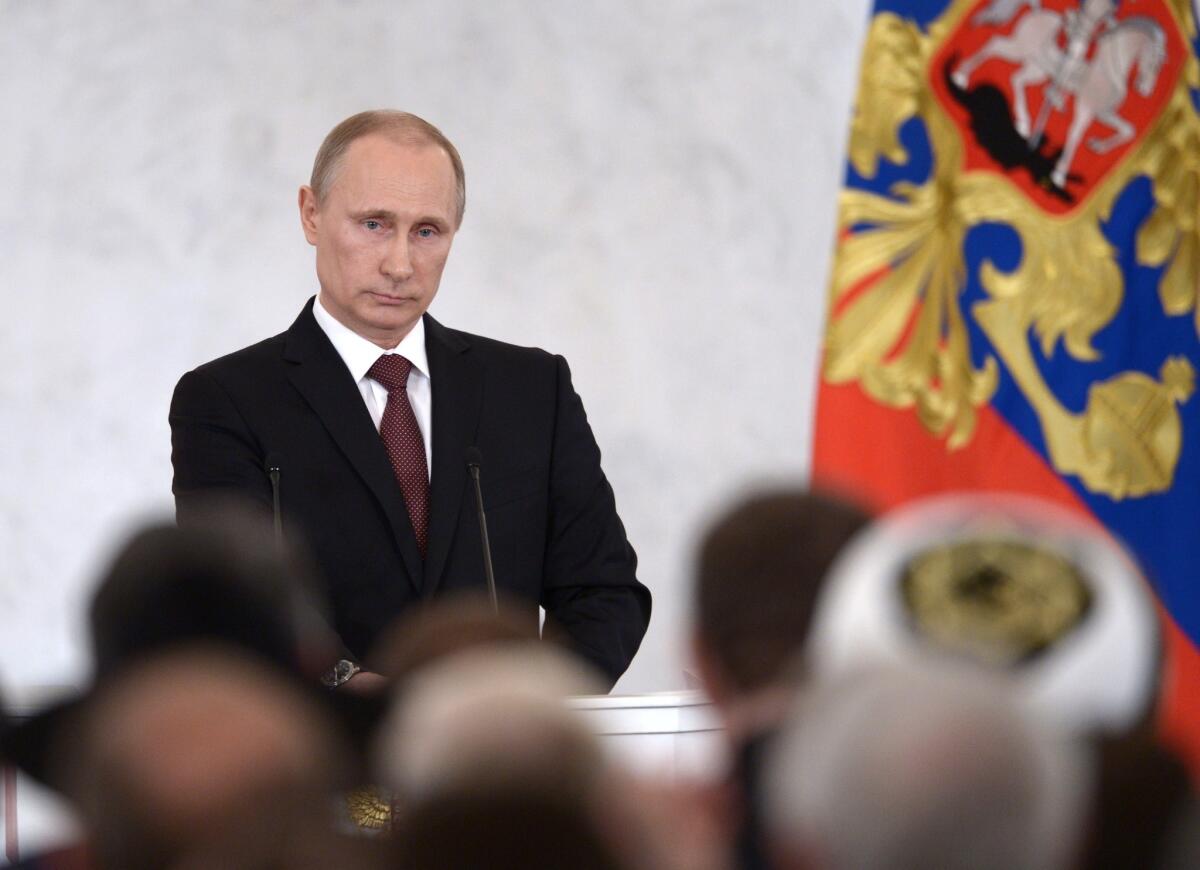If Crimea can vote to secede, why can’t, say, Texas?

- Share via
In his combative speech to members of the Russian parliament and other dignitaries Tuesday, Vladimir Putin played his trump card in defending the secession of Crimea from Ukraine.
Putin pointed to “the well-known Kosovo precedent, a precedent our Western colleagues created with their own hands in a very similar situation, when they agreed that the unilateral separation of Kosovo from Serbia — exactly what Crimea is doing now — was legitimate and did not require any permission from the country’s central authorities.”
Actually, as several commentators have pointed out, there are significant differences between Kosovo and Crimea. For example, in Kosovo, ethnic Albanians had been the victims of relentless violence, and prolonged negotiations on autonomy had gotten nowhere. Ethnic Russians in Crimea hadn’t been similarly mistreated, and the referendum was fast-tracked before there was time for negotiations for greater autonomy for Crimea within Ukraine.
PHOTOS: A peek inside 5 doomed dictators’ opulent lifestyles
But suppose a Crimea referendum were held without meddling by Russia and after a long period of fruitless negotiation with the central government of Ukraine?
In September, voters in Scotland will decide whether to secede from the United Kingdom in a referendum promoted by the “devolved” (regional) Scottish government. Britain’s prime minister and other national figures oppose secession, but they are apparently willing to abide by the referendum’s result even if it means dismembering the UK. Britain also has made clear that Northern Ireland could reunite with the Irish Republic if a majority in the north agreed.
If Scotland can secede from Britain, why can’t Crimea secede from Ukraine?
A hypothetical closer to home: What if an American state (Texas? Alaska? Oregon?) decided to hold a referendum on independence, appealing to the principle of “self-determination of peoples” enshrined in the U.N. Charter? Would the federal government be in violation of international law if it suppressed the rebellion?
Granted, the U.S. government wouldn’t be as tolerant of secession as the UK is. It isn’t just that so much blood was shed in the Civil War to preserve the Union. In 1869, the Supreme Court ruled that the Union was “perpetual” and “indissoluble.” A state can check in, but it can’t check out.
Still, suppose in the distant future the inhabitants of a state became truly estranged from the rest of the nation — culturally, linguistically or politically — and invoked the U.N. Charter in a bid to exercise self-determination? Would a president be under pressure from the rest of the world to let those people go?
And if he said no, what would be the explanation? That unlike other countries, the U.S. is “perpetual” and “indissoluble”? The secessionists could come back with a quotation from the Declaration of Independence: “When in the course of human events, it becomes necessary for one people to dissolve the political bands which have connected them with another, and to assume among the powers of the Earth, the separate and equal station to which the laws of nature and of nature’s God entitle them...”
ALSO:
What if all the lights go out?
Follow Michael McGough on Twitter @MichaelMcGough3
More to Read
A cure for the common opinion
Get thought-provoking perspectives with our weekly newsletter.
You may occasionally receive promotional content from the Los Angeles Times.










